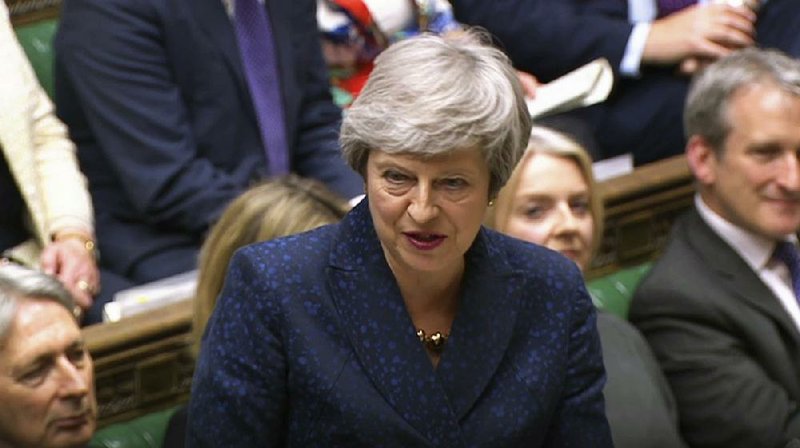LONDON -- Prime Minister Theresa May's officials are drafting a deal between the British government and the opposition Labor Party that would break the deadlock that has paralyzed the nation's exit from the European Union.
According to people familiar with the matter, new clauses are being written into the Withdrawal Agreement Bill that would provide for an arrangement like a customs union. That would guarantee that there are no checks on goods crossing the border between Northern Ireland, which is part of the U.K., and Ireland, a member of the EU.
The move is an attempt to meet a key demand from Jeremy Corbyn's Labor Party, which has said it wants to protect jobs and trade. The two sides are scheduled to meet Tuesday to discuss the issue.
But there is a risk that pro-Brexit Cabinet ministers like Liam Fox and Andrea Leadsom will quit rather than sign up to such a close tariff and trade regime with the EU.
Britain was due to leave the EU at the end of March, but May has been forced twice to ask the EU to give the country more time to finalize the terms of the split after members of Parliament repeatedly rejected her deal.
Months of political stalemate and uncertainty over the future of Brexit have hurt business investment in the U.K., and industry leaders are crying out for a resolution.
The Liberal Democrats, which supports remaining in the EU, was the big winner in last week's local elections, which were disastrous for May's Conservatives and bad for Corbyn's Labor Party. But May, writing in the Mail on Sunday newspaper, said the election results showed that voters want the government to get on with delivering Brexit.
"To the leader of the opposition, I say this: let's listen to what the voters said in the elections and put our differences aside for a moment," May wrote. "Let's do a deal."
May opened cross-party talks with Labor last month after the House of Commons voted for a third time to reject the divorce package she'd negotiated with the EU.
A key meeting on Tuesday will determine whether the two sides can strike an agreement on any single plan, according to the people familiar with the matter, who asked not to be identified because the deliberations are confidential.
If the two sides can't reach a deal, the focus will switch to whether Labor and the government can agree on a way to put a range of options before Parliament. A series of so-called indicative votes would allow rank-and-file politicians to choose the way forward.
Labor is said to want May to entrench the customs arrangement into law permanently, guaranteeing it will remain in place even after the next general election, scheduled for 2022.
May is offering Corbyn arrangements that would allow a future Labor government to pursue a full customs union with the EU but that would also allow a future Conservative administration to adopt a looser relationship that allows Britain to strike trade deals with other countries around the world, according to one person familiar with the discussions.
Progress has been easier in other areas of the talks, including environmental protection and workers' rights, according to the people.
"We have to find a way to break the deadlock," May wrote in the Mail on Sunday. "We will keep negotiating, and keep trying to find a way through. Because the real thing that matters now is delivering Brexit and moving on to all the other issues people care about."
While some Tories sounded optimistic, John McDonnell, Labor's Treasury spokesman, dismissed the idea that the talks are close to success.
He told the BBC that weekend leaks of what May was going to offer Labor this week represent "bad faith" -- the talks are supposed to be confidential, he said.
Asked if he trusted May, McDonnell replied: "No. Not after this weekend. She's jeopardized the negotiations for her own personal protection."
A Section on 05/06/2019

